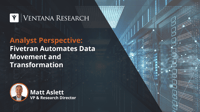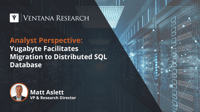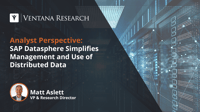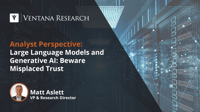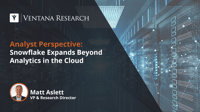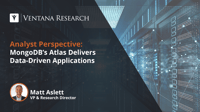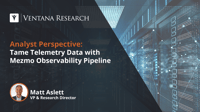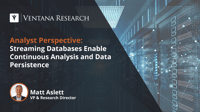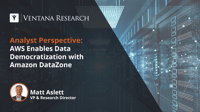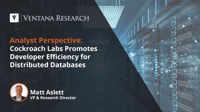Despite best intentions, many organizations still struggle with some fundamental aspects of data processing and analytics. Taking data from operational applications and making it available for analysis is a first step, but data management remains a perennial challenge. Data movement and transformation difficulties can lead to delays and data quality problems that prevent organizations from generating value from data. The inability to govern and integrate data from multiple data sources prevents...
Read More
Topics:
Cloud Computing,
Data Management,
Data,
Digital Technology,
data operations,
Analytics & Data
I previously explained the arguments in favor of adoption of distributed SQL databases, the new generation of operational data platforms designed to combine the benefits of the relational database model and native support for distributed cloud architecture. It is critical for distributed SQL vendors to engage with developers to ensure they are considering the importance of resilience that spans multiple data centers and/or cloud regions as they choose the databases that will underpin...
Read More
Topics:
Cloud Computing,
Data,
Digital Technology,
Analytics & Data,
Operational Data Platforms
Data fabric has grown in popularity as organizations struggle to manage data spread across multiple data centers, systems and applications. By providing a technology-driven approach to automating data management and governance across distributed environments, data fabric is attractive to organizations seeking to simplify and standardize data management. I assert that by 2025, more than 6 in 10 organizations will adopt data fabric technologies to facilitate the management and processing of data...
Read More
Topics:
Cloud Computing,
Data Management,
Data,
Digital Technology,
data operations,
Analytics & Data,
analytic data platforms
The data and analytics sector rightly places great importance on data quality: Almost two-thirds (64%) of participants in Ventana Research’s Analytics and Data Benchmark Research cite reviewing data for quality and consistency issues as the most time-consuming task in analyzing data. Data and analytics vendors would not recommend that customers use tools known to have data quality problems. It is somewhat surprising, therefore, that data and analytics vendors are rushing to encourage customers...
Read More
Topics:
Analytics,
Data Governance,
Data Management,
Data,
Digital Technology,
natural language processing,
AI & Machine Learning,
Analytics & Data
The data platforms market has traditionally been divided between products specifically designed to support operational or analytic workloads, with other market segments having emerged in recent years for data platforms targeted specifically at data science and machine learning (ML), as well as real-time analytics. More recently, we have seen vendor strategies evolving to provide a more consolidated approach, with data platforms designed to address a combination of analytics and data science, as...
Read More
Topics:
Analytics,
Business Intelligence,
Cloud Computing,
Data,
Digital Technology,
AI & Machine Learning,
Analytics & Data,
analytic data platforms,
Operational Data Platforms
The recent publication of our Value Index research highlights the impact of intelligent applications on the operational data platforms sector. While we continue to believe that, for most use cases, there is a clear, functional requirement for either analytic or operational data platforms, recent growth in the development of intelligent applications infused with the results of analytic processes, such as personalization and artificial intelligence (AI)-driven recommendations, has increasing...
Read More
Topics:
Analytics,
Business Intelligence,
Cloud Computing,
Data,
Digital Technology,
Analytics & Data,
analytic data platforms,
Operational Data Platforms
As engagement with customers, suppliers and partners is increasingly conducted through digital channels, ensuring that infrastructure and applications are performing as expected is not just important but mission critical. My colleague, David Menninger, recently explained the increasing importance of observability to enable organizations to ensure that their systems and applications are operating efficiently. Observability has previously been the domain of the IT department but is increasingly...
Read More
Topics:
Data Management,
Data,
Digital Technology,
Analytics & Data
Success with streaming data and events requires a more holistic approach to managing and governing data in motion and data at rest. The use of streaming data and event processing has been part of the data landscape for many decades. For much of that time, data streaming was a niche activity, however, with standalone data streaming and event-processing projects run in parallel with existing batch-processing initiatives, utilizing operational and analytic data platforms. I noted that there has...
Read More
Topics:
Analytics,
Data,
Digital Technology,
Streaming Analytics,
Analytics & Data,
Streaming Data & Events,
analytic data platforms,
Operational Data Platforms
I have previously written about the importance of data democratization as a key element of a data-driven agenda. Removing barriers that prevent or delay users from gaining access to data enables it to be treated as a product that is generated and consumed, either internally by employees or externally by partners and customers. This is particularly important for organizations adopting the data mesh approach to data ownership, access and governance. Data mesh is an organizational and cultural...
Read More
Topics:
Cloud Computing,
Data Governance,
Data Management,
Data,
Digital Technology,
data operations,
Analytics & Data
I recently wrote about the potential use cases for distributed SQL databases as well as techniques being employed by vendors to accelerate adoption. Distributed SQL is a term that is used by several vendors to describe operational data platform products that combine the benefits of the relational database model and native support for distributed cloud architecture, including resilience that spans multiple data centers and/or cloud regions. I noted that compatibility with existing database tools...
Read More
Topics:
Cloud Computing,
Data,
Digital Technology,
Analytics & Data,
Operational Data Platforms
